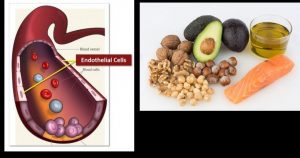“Endothelial progenitor cells and microparticles are emerging as novel markers of cardiovascular disease risk, which could potentially be modified by dietary fat. We have previously shown that replacing dietary saturated fatty acids with monounsaturated or n–6 (ω-6) polyunsaturated fatty acids improved lipid biomarkers, blood pressure, and markers of endothelial activation, but their effects on circulating endothelial progenitor cells and microparticles are unclear.”
.
“The Dietary Intervention and VAScular function Study investigated the replacement of 9.5–9.6% of total energy contributed by saturated fatty acids with monounsaturated fatty acids or n–6 polyunsaturated fatty acids for 16 weeks on endothelial progenitor cells and microparticle numbers in United Kingdom adults with moderate cardiovascular disease risk.”
.
“In this randomized, controlled, single-blind, parallel-group dietary intervention, men and women aged 21–60 years (n = 190) with moderate cardiovascular disease risk consumed 1 of three 16-weeks isoenergetic diets.”
.
“The monounsaturated fatty acids-rich diet increased endothelial progenitor cell numbers (+28.4%).”
.
“Replacement of….. saturated fatty acids with monounsaturated fatty acids increased endothelial progenitor cells numbers, and replacement with either saturated fatty acids with monounsaturated or n–6 polyunsaturated fatty acids decreased microparticle numbers, suggesting beneficial effects on endothelial repair and maintenance.”
.
M.Weech, et al
Replacement of dietary saturated fat with unsaturated fats increases numbers of circulating endothelial progenitor cells and decreases numbers of microparticles: findings from the randomized, controlled Dietary Intervention and VAScular function (DIVAS) study
American Journal Of Clinical Nutrition — Volume 107 #6 — June 2018 — page 876
.
.
TheETG nutrition medicine —–
https://theetgtrackclub.com/documents/TheETGnutrimedicine.pdf
.
TheETG heart disease repair —–
https://theetgtrackclub.com/documents/TheETGheartfix.pdf

